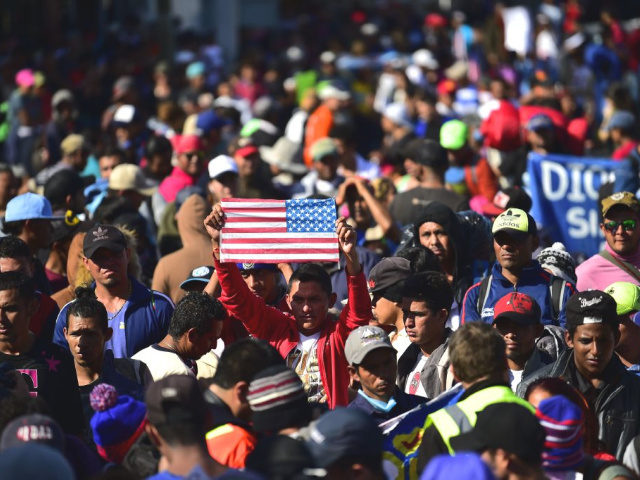Central American states have dramatically stepped up their efforts to block the migrants heading to the United States, Ken Cuccinelli, acting deputy head of Homeland Security, said at a press conference on January 24.
“We’re seeing them perform spectacularly well compared to the last year,” he told reporters January 24.
The cooperation from Mexico and the Latin American countries is also helping the U.S government expand novel anti-migration programs, such as a fast-track process for returning Mexican migrants, he said.
U.S. officials are also trying to extend the anti-migration programs to include migrants from Africa and India, Cuccinelli said:
As we talk with Honduras and as we continue to talk to Guatemala and Mexico, one of the subjects of discussion is not just other people from this hemisphere. … “Extra continentals” would participate in those agreements. Those are live discussions. Those are possibilities that we are investigating with these other countries, and it is very much on the table, but there is nothing that I have really to report to you at this point in time.
The Latin American countries gain from the cooperation, Cuccinelli said: “A secure region is more stable and prosperous, and it will attract both public and private investment more readily and will provide opportunities for the youth who represent the future.”
The reporters at the press conference declined to ask Cuccinelli how Central American countries are getting measurable benefits in exchange for their cooperation, such as foreign aid and government-pushed investment in the countries.
U.S. immigration agencies have sent officers to work with Guatemalan forces to block migration, he said:
We’re there to help them with the training and support that can help them [improve] their own capabilities faster than they would otherwise be able to do. … This kind of support will also enable Guatemala to dismantle the human smuggling networks that use or operate in Guatemala, something the Guatemalan government is keen to do.
U.S. officials are also working with officials in Honduras, he said:
DHS is currently working with the [U.S.] Departments of State and Justice to finalize the asylum cooperative agreement that we’ve been working on with Honduras, with the goal of beginning operations as soon as next week. A pre-deployment site survey team will be there in the next week of CBP and ICE officials, along with their Honduran counterparts, to complete the planning phases.
In El Salvador, he said:
President [Nayib] Bukele has been in office less than a year, and he has already made public safety in El Salvador, an extremely high priority, and he has achieved very fast success. … That has had a real impact on MS-13 in El Salvador, which is its home base, so we’ve been just extremely pleased to see the success.
Mexico’s cooperation with the United States has allowed U.S. officials to keep more than 57,000 migrants in Mexico prior to their asylum hearings in the United States, Cucinelli said.
U.S. officials are also adopting fast-track migrant-processing procedures at more of the locations where migrants cross the U.S. border, Cuccinelli said:
We always bring these online in the most intense parts of the border like [the Rio Grande Valley], El Paso, and so forth. But here we are at the end of January, and I expect by the early part of February that these will literally be being implemented across the entire border. So maybe two weeks from now.
Pro-migration groups also oppose the new migrant-processing programs. On December 2019, BorderReport.com reported:
The legal brief by Las Americas Immigrant Advocacy Center against the HARP and PACR programs comes on the heels of a lawsuit filed Wednesday by the Southern Poverty Law Center against federal policies they say have turned the American asylum process into a “deportation machine.”
HARP stands for Humanitarian Asylum Review Process. PACR is the so-called Prompt Asylum Claim Review program. Both are being implemented as a pilot program in CBP’s El Paso Sector. Both have resulted in asylum seekers being held in Border Patrol stations without access to lawyers or advocates for the duration of their process and to the expedited removal of others, the brief alleges.
“The new policy eviscerates any meaningful opportunity for asylum seekers to consult with counsel during the credible fear process. […] The new policy all but guarantees that many asylum seekers will be erroneously sent back to countries where they face danger and that, as a result, some of them will be killed or endure horrific violence,” the brief states.
Cuccinelli warned that the migration levels — although much reduced since May 2019 — are still at emergency levels: “There are an awful lot of programs in place that we have worked on with our partners throughout Mexico and Central America and other parts of the world, frankly, so that the same numbers are being managed better, [but] they’re still crisis-level numbers.”
He added that 1,500 migrants crossed the border on one mid-January day. “We’ve been using every tool available to address the crisis, and our efforts have been working,” he said.
Cuccinelli did not address the high level of white-collar migration into the United States, much of which occurs when legal visa workers overstay their visas or find ways to extend their legal residency.

COMMENTS
Please let us know if you're having issues with commenting.